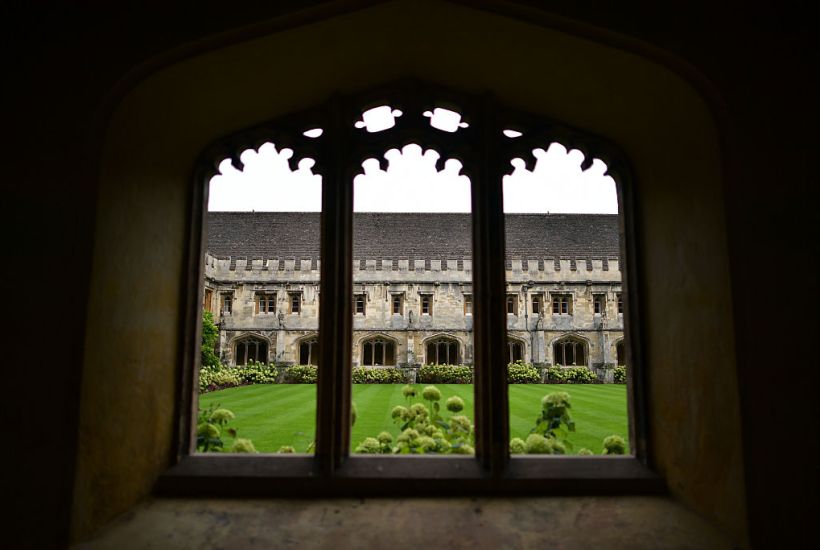The sheer scale of the outrage over Magdalen College Oxford electing to remove a portrait of the Queen from the postgraduate common room can seem on the face of it to be absurd; why should we care what pictures a group of students choose to put on the wall? We didn’t care when they put it up in 2013. Why should we mind if they happen to have better decor available today?
A little digging however shows that, as is generally the case, this latest flashpoint is less about the putative cause and more to do with ideology.
The portrait was taken down because ‘for some students depictions of the monarch and the British monarchy represent recent colonial history’.
In this light, the removal of the portrait represents yet another attempt at ‘decolonising’ a British institution, a trend which has involved plenty of heated arguments over the last few years – see the new refusal of some Oxford academics to teach Oriel College students until the Rhodes statue is removed.
That the motion in this case was brought forward by an American student does not complicate the narrative. Decolonisation is, after all, the process by which an adherent to the would-be global monoculture arrives in a place, insists on the removal of anything that makes them feel uncomfortable, and the subsequent adoption of their cultural practices.
It’s this part that makes people so mad; they feel instinctively that a British university ought to be in some way British. The conservative philosopher Michael Oakeshott once argued that the purpose of education is to initiate the recipient into a civilisation and its various inheritances. Universities do still seem to hold to a version of this dictum, but it is arguable that the culture students are brought into does more to dismantle their sense of pride in this heritage than to strengthen it.
It is not a coincidence that graduates and non-graduates vote very differently to one-another, although despite what some on the right assert it is not exactly the fault of individual professors attempting to indoctrinate their students who are to blame. That mechanism would, after all, require undergraduates to first attend and then pay attention to their lectures, which seems like something of a tall order. The issue is more the balance of staff within universities, the material they produce in their disciplines, and the effect this has in defining the campus experience more broadly.
The claim that things are just student politics, or that the obsession with what goes on at Oxford and Cambridge is a failure to pay attention to the real world ignores the fact that (for the latter two universities in particular) the students of today are tomorrow’s leaders.
To engage in a little devilment, one of the downstream consequences of the wider loss of confidence in the existence of a coherent and shared national identity and story can be seen in education secretary Gavin Williamson’s condemnation of the portrait’s removal.
Williamson complains that the Queen has ‘worked tirelessly to promote British values of tolerance, inclusivity and respect’. The problem is that these are not uniquely ‘British’ values at all; they are broader Western liberal values.
But to define more specifically what it means to be ‘British’ as opposed to ‘Irish’ or ‘American’ would produce the result that people would feel excluded, just as students might feel uncomfortable being reminded of the history of the nation in which they study.
Definitions by their nature are exclusionary if they are useful. If a definition does not rule certain things out, then it is not defining a set. Even the claim that to be British is to be tolerant and inclusive is exclusionary in its definition of those who are not as beyond the pale.
That some citizens will not possess those characteristics does not mean the concept lacks power; we can say the country as a collective averages a certain set of properties, but not others. Similarly, an institution that exists in part to pass on Britain’s cultural and historical heritage to the next generation may not be suited to those who find them objectionable.
Which brings me to the most important point. It is fairly clear that a major part of our national nervous breakdown over exactly who we are is a consequence of America’s far more bombastic version of the same phenomenon. If we want to avoid having to go through similar waves of interminable discussion it is crucial to decolonise our politics and campuses in the only way that matters: by separating them from the American empire. And in order to do so, we can take inspiration from the students insisting on decolonisation.
The idea of what this would actually meaningfully look like in a British context has received relatively little attention; it probably does not consist of taking down portraits of Britons to replace them with inspirational overseas leaders, no matter how worthy. As the NHS recently found out, the American term ‘BIPOC’ (Black, Indigenous, and People of Colour) does not work so well when applied to the British context, where pretty much everyone other than European migrants falls into one of those categories.
But it has given me an idea: while the Normans took over from the Saxons, who booted the Welsh out to the fringes of Great Britain, all three groups are descended from the Yamnaya who replaced the neolithic farmers of Europe.
As a small apology to the former inhabitants of these islands, we could all agree to attempt to recreate the pre-Proto-Indo-European language spoken by those people, and in doing so finally render ourselves immune to the transmission of American neuroses through the simple expediency of being unable to understand them.
Got something to add? Join the discussion and comment below.
Get 10 issues for just $10
Subscribe to The Spectator Australia today for the next 10 magazine issues, plus full online access, for just $10.




















Comments
Don't miss out
Join the conversation with other Spectator Australia readers. Subscribe to leave a comment.
SUBSCRIBEAlready a subscriber? Log in